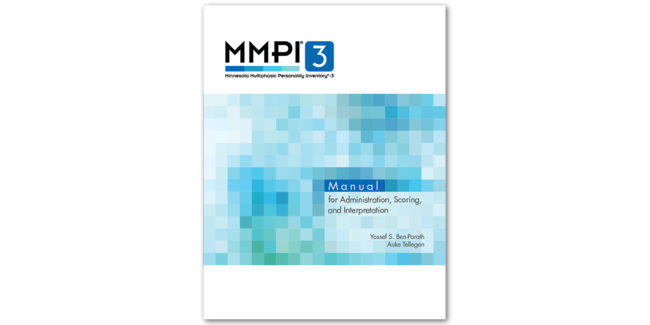- Joined
- Oct 30, 2016
- Messages
- 995
- Reaction score
- 634
I just scored my first MMPI-3 and was wondering if anyone else has used it. It's very different from the MMPI-2 upon first glance.

I'm trying to find a measure that taps into both personality dimensions and Clinical pathology. I love the mcmi 3 but it has its downsides and I think the mmpi 2 probably does the best job of assessing clinical symptoms and personality with the code-type work. I don't think the mcmi 3 will give me what I'm looking for, but I'm attending a 6 hours training next month so I may be wrong. As of now, I tend to give the PAI with the mcmi but I would prefer giving one assessment over two.
I don't love the PAI but it's adequate. Faster than mmpi and lower required reading levelPart of this depends on your clinical populations. Like, if validity is much an issue, I really don't like MCMI or PAI as their validity indicators are not very strong IMO.
I don't love the PAI but it's adequate. Faster than mmpi and lower required reading level
I was using mmpi 2, not the RF, which I think is 6th or maybe even 8th grade (could be wrong on that). PAI is 4th.I thought they were essentially equivalent? Isn't PAI 4th grade, and MMPI-II-RF like 5th grade? And I believe that MMPI-3 has been changed enough to lower its required reading level as well.
I was using mmpi 2, not the RF, which I think is 6th or maybe even 8th grade (could be wrong on that). PAI is 4th.
It is definitely more similar to the RF and I prefer the MCMI 3 to the 4, but have used both. I think the mmpi 2 had some variation on reading ability depending on the scale, but would have to look back at my resources to confirmI don't know how much of an improvement the MCMI-4 is over the 3, but it's out and available. Think it was released a year or so ago.
I believe the initial difference in reading levels between the MMPI-2 and PAI was determined to be due to differences in the algorithms used to rate them, hence the more recent downward adjustment of the MMPI-2. At least that's what I vaguely recall.
I don't yet have any direct experience with the MMPI-3. I'm waiting on getting the manual at some point. My understanding is it's much more similar to the RF than to the 2, which would make sense with Ben-Porath as an author.
I have, and I have worked with it during development. I have a few papers in r&r with it. It is basically equal to the RF for validity scales (.95+ correlation) and equal or greater predictive validity for the substantive scales. The reforming decreased average scale elevations and the new scales (e.g. IMP, EAT) are promising and interesting.I just scored my first MMPI-3 and was wondering if anyone else has used it. It's very different from the MMPI-2 upon first glance.
Good to hear. I'm excited to learn more during the training.I have, and I have worked with it during development. I have a few papers in r&r with it. It is basically equal to the RF for validity scales (.95+ correlation) and equal or greater predictive validity for the substantive scales. The reforming decreased average scale elevations and the new scales (e.g. IMP, EAT) are promising and interesting.
the MMPI symposium is free this year again and virtual. I highly recommend it to see emerging research on the MMPIGood to hear. I'm excited to learn more during the training.
How would one go about signing up for the symposium?the MMPI symposium is free this year again and virtual. I highly recommend it to see emerging research on the MMPI
They typically list it on the Press's website but I cant find it. The symposium is broken into two parts typically- half day CE sessions and a research symposium at the end.How would one go about signing up for the symposium?

They mention at the bottom of that page that they've rescheduled the symposium to June 2022. Is that the same one you're talking about?They typically list it on the Press's website but I cant find it. The symposium is broken into two parts typically- half day CE sessions and a research symposium at the end.

MMPI Training Opportunities
Learn more about upcoming MMPI training opportunities.www.upress.umn.edu
I would suspect this is an oversight and would touch base with them. We were told we would be provided registration info as presenters but I havent gotten it yet, likely as they are still figuring out the schedule of times and such.
Ted Milon is dead, and so is David Wechsler. I sometimes wonder why these instruments carry the names on, ad nauseum. They drift quite a bit from the orginators (at least the Wechsler stuff)...and Milon's stuff was always a bit outside the DSM anyway.
That's for in person. The virtual research symposium is still going (We were just alerted that our stuff was accepted last week).They mention at the bottom of that page that they've rescheduled the symposium to June 2022. Is that the same one you're talking about?
Ah, understood, thank you. I was wondering if they were going to offer a virtual version.That's for in person. The virtual research symposium is still going (We were just alerted that our stuff was accepted last week).
Man, if these tests require at least a 4th grade reading level, then there are significant validity concerns for people with borderline IQs or dyslexia. This is a sizeable minority of the population that wouldn't be able to access these tests. Do y'all test reading before giving?
I am doing the one on June 16thAnyone do the workshops from Pearson? What are they like?

Minnesota Multiphasic Personality Inventory-3
The MMPI<sup>®</sup>-3 builds on the history and strengths of the MMPI instruments to provide an empirically validated, psychometrically up-to-date standard for psychological assessment. •<a...www.pearsonassessments.com
This is basically what I've found in my research.the conceptual overlap with the 2-RF and the conceptualization behind the updates suggest (to me, at least) no reason to believe any differences in what 1st and 3rd parties find on the MMPI-3 would be greater than anything we've seen with the MMPI-2-RF.
I'm sticking w the 2RF until I see the III regularly utilized in court. It will be adopted eventually, but I want to see more published too.Not yet. I mostly use the MMPI for legal cases, not very relevant for most of my clinical cases. For the legal cases, many of my colleagues are sticking with the MMPI-II-RF for now until more of the legal/litigation lit progresses some more. Until then, just planning on collecting MMPI-3 articles and attending some CEs on it here and there.
Is the masculinity/gender scale part of the MMPI-3? Can someone remind me what purpose this scale serves/served?
No, the interest scales (scale 5 converted to AES and MEC in the mmpi-2-rf) were removed entirely, as was all associated item content.Is the masculinity/gender scale part of the MMPI-3? Can someone remind me what purpose this scale serves/served?

I much prefer the alternative model, so that's good to know. Yes, it's very similar to the RF. The correlations between the two tests are ridiculously high.Glad to see this discussion on here. I teach our personality assessment class and didn't bother with the MMPI-3 last year (since I was scheduled to cover it basically the week it came out) although I did do a 2-hr webinar prior to the release. I also finally fought with Pearson (they SUCK) to get Qglobal access a few weeks ago and we gave our first MMPI-3 last week. I just looked at a few days ago. It's pretty similar to the MMPI-2-RF which I *far* prefer to the MMPI-2 for ease of interpretation with the hierarchical structure. I also appreciate the changes with the norming sample, moving the most confusing scales (looking at you, RC3 Cynicism) and adding ones of value like eating issues.
While we're discussing, it's worth noting that the electronic score report for the PAI actually now includes Alternative Model for Personality Disorder (AMPD) traits scored from PAI items, which makes the PAI easier to incorporate into a HiTOP assessment.
I've always found the Hitop and most of the other higher-order modeling of psychopathology to be a compelling but simplistic classification model (e.g., Littlefield, Lane, Gette, Watts, & Sher). I like it, and I use it, but it leaves a lot to be desired in terms of inclusion and exclusion criteria for domains.Glad to see this discussion on here. I teach our personality assessment class and didn't bother with the MMPI-3 last year (since I was scheduled to cover it basically the week it came out) although I did do a 2-hr webinar prior to the release. I also finally fought with Pearson (they SUCK) to get Qglobal access a few weeks ago and we gave our first MMPI-3 last week. I just looked at a few days ago. It's pretty similar to the MMPI-2-RF which I *far* prefer to the MMPI-2 for ease of interpretation with the hierarchical structure. I also appreciate the changes with the norming sample, moving the most confusing scales (looking at you, RC3 Cynicism) and adding ones of value like eating issues.
While we're discussing, it's worth noting that the electronic score report for the PAI actually now includes Alternative Model for Personality Disorder (AMPD) traits scored from PAI items, which makes the PAI easier to incorporate into a HiTOP assessment.